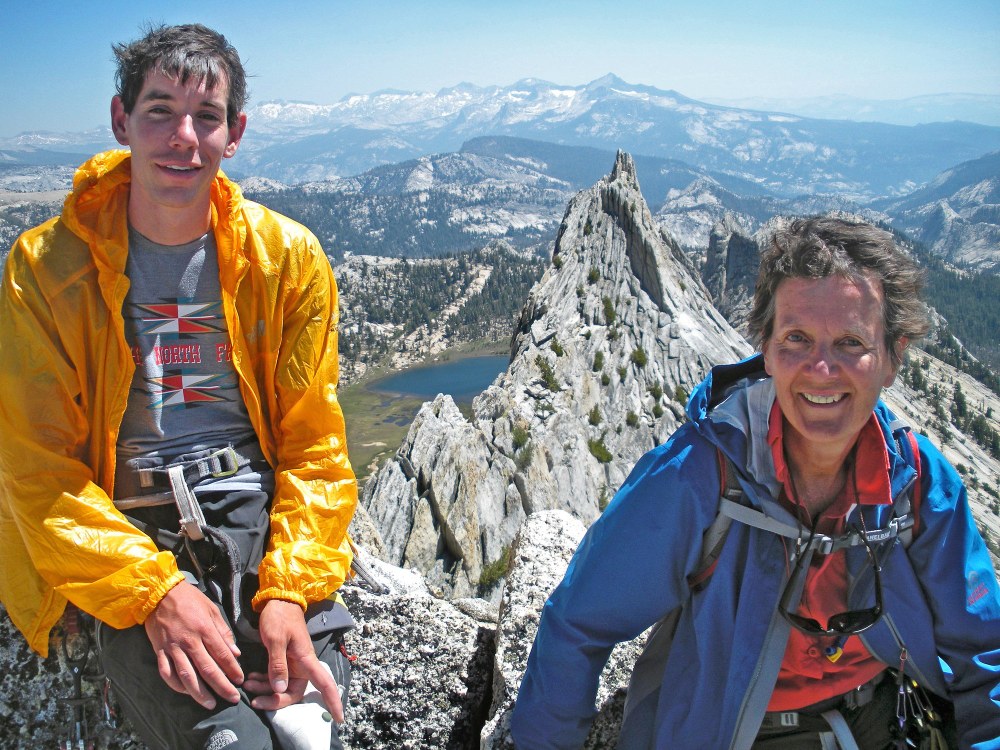
They say the apple doesn’t fall far from the tree. So it’s not hard to imagine that the mother of the world’s most audacious rock climber would be an interesting person herself. In The Sharp End of Life, Alex Honnold’s mom, Dierdre Wolownick, recounts her upbringing in an immigrant household, a difficult marriage, raising her children as a single mom, teaching in multiple languages, succeeding as a musician and children’s book author, and then, late in life, taking on the physical challenges of marathon running and learning to climb.
At the age of 66 and with the help of her son, Dierdre became the oldest woman to climb Yosemite’s El Capitan. Library Journal says, “Honnold fans who enjoyed his memoir Alone on the Wall or saw the Oscar-winning documentary Free Solo will appreciate [Dierdre] Wolownick's intimate stories.”
MOUNT CONNESS, SIERRA NEVADA, 12,590
Lightning flashed, somewhere, not far enough. Again. Thunder growled, scolded us to go even faster. If someone died today, it would be my fault. That pushed me a bit faster. But you can’t climb without sufficient air to deliver oxygen to the muscles you need, and I wasn’t getting enough of either. If someone died today... That thought didn’t help my lungs at all. My body had only been growing older since I started climbing, and I understood why my friends had tried to discourage me from Conness. But I wanted to find out if I could climb it. Conness was so big, so beautiful! So out of reach. Had I become a climber worthy of it?
When I reached the top, gasping, Alex was pointing toward the way down on the other side.
“Go, Mom! Over there – down!” Icy rain battered us, mixed with sleet, ice, and snow.
“But I –”
“Go, Mom – I’ll sign the book for you.” I could barely hear his shouts over the roar of the wind and the pounding rain. For weeks I had looked forward to signing my first alpine highcountry register at the summit of Conness. We had talked about that. Alex knew. But we all knew what could happen to lightning rods, creeping across the top of a tempting peak in a major storm.
And “down,” it turned out, was hours away. The clouds had already lowered until they were on top of us, enveloping the rocks. As we scrambled through cloud after cloud and lightning struck all around us, the whole inside of the cloud lit up: we could no longer tell where the lightning was striking.
This was information I never thought I would learn firsthand.
It rained harder, colder, sideways, or swirling or driving into our faces. All the tiny rivulets we’d hopped over in all the meadows on the way up had turned into raging torrents. I was soaked in near-freezing water up to my knees.
No one spoke. If the terrain hadn’t been so harsh, we would have run. I picked my way as carefully as I could while going as fast as I could manage. We flew along, unable to hear anything but the water slapping our hoods and our faces. Night fell, and still the storm raged around us.
The distance wasn’t any farther than I’d hiked on previous outdoor climbing days. But fear of death by lightning, fierce wind, treacherous footing, and icy-wet cold – along with the sustained effort of twelve very fast pitches after more than seven miles of hiking – had worn me down. For the last hour of slogging at top speed through the pitch-dark forest, I held on to a loop on the back of Alex’s backpack.
Alex calls that cheating. I called it survival.
He and I are the alpha and the omega of climbing skill. He has no idea how far out of my comfort zone he takes me or how hard it is for me to go where he goes. But I go. I try. He respects that, I think, even though he’s often incredulous at how shattered, how drained it leaves me.
We climb for the same reasons. I think – I hope – he understands that. I know he understands pushing limits: he free-solos the hardest vertical climbs imaginable. It’s just that me pushing my limits doesn’t look anything like him pushing his. He rolls his young eyes. That’s okay. I still need to push them.
Being up here helps me forget. Sciatic pain. Arthritic knee. Tennis elbow. Crooked, unyielding toes. Deficient lungs. The limits of my body. None of that matters up here. The rock is ageless, unyielding. It gives no quarter. My mind is emptied of everything but the next handhold or foothold.
Being up here helps me understand my children, and also myself. Helps me see what I’m capable of. Or not. Essential knowledge, for an informed life.
Dierdre’s book The Sharp End of Life: A Mother’s Story is available at the Seattle Program Center bookstore, mountaineersbooks.org, and wherever books are sold.
This article originally appeared in our Summer 2019 issue of Mountaineer Magazine. To view the original article in magazine form and read more stories from our publication, click here.
 Dierdre Wolownick
Dierdre Wolownick